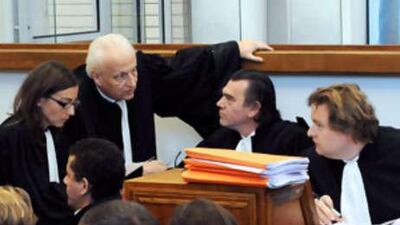It was a tragically familiar story: a child tortured and battered to death by the adults who should have been caring for him. What was different about the death of Marc, a five-year-old French boy whose short life ended in a blizzard of punches in Jan 2006, was that the doctors who failed to spot the serial abuse were held to account alongside the stepfather who delivered the blows. Last week, a court in the French town of Douai sentenced eight people for their part in the death. David da Costa, 38, who punched Marc in the head until he suffered a cerebral haemorrhage, was jailed for life. Isabelle Gosselin, 35, the child's mother, received 30 years; three other relatives and a childminder were given suspended sentences.
The postmortem revealed Marc had suffered a series of assaults and injuries, including cigarette burns, broken ribs and a fractured pelvis, but two doctors who saw the boy before his death accepted his mother's explanation that he was self-harming. Christian Tirloy and Michel Vellemans were found guilty of failing to help a person in danger, fined and given three-year suspended prison sentences.
"These sentences are a warning to French society, professionals who work with children, the medical community and politicians to stop keeping silent and to understand the duty of reporting child abuse to the authorities," said Catherine Bonnet, a French child psychiatrist who in the '90s became the target of a group campaigning on behalf of accused parents. In 1998, she was accused of making false allegations of child abuse against parents and banned from practising for three years. "The pendulum has swung too far and professionals have been condemned for detecting, reporting and preventing child abuse." In 2002, Ms Bonnet's case was taken up by the UN special rapporteur on child exploitation, who urged the French Medical Board to "review its procedures in order to support rather than condemn doctors who report their suspicions of child abuse".
The French case has resonated among medical professionals in the UK, where for the past decade campaigners have been waging a media war against doctors who work in child protection. Paediatricians are also fighting a running battle with their regulatory body to defend their right to report suspected cases of abuse without fear of disciplinary action. Dr John Bridson, the chairman of Professionals Against Child Abuse (Paca), founded in the UK last year to defend paediatricians, said the French trial was "symbolic of the lose-lose situation in which child-protection professionals find themselves, both in France, the UK and other countries".
The case that led to the birth of Paca was that of Dr David Southall, a paediatrician and one of the UK's most widely known child-protection experts, who has faced a record number of investigations by his regulatory body, the General Medical Council (GMC). In 2004, he was found guilty of serious professional misconduct and banned from child-protection work after raising concerns about the safety of the surviving child of a woman who had been jailed for the murder of two of her three babies. Dr Southall's suspicions were raised when, in a television interview, the woman's husband described a nosebleed his 11-week-old son had suffered while alone with him just 10 days before his death.
Dr Southall, who had conducted research that indicated a relationship between nosebleeds in children of that age and suffocation attempts, contacted the police and the father complained to the GMC. In September, in a successful application to have the ban lifted, all five of the experts who gave evidence agreed Dr Southall had been right to report his concerns and that his research had subsequently been vindicated by other work.
Dr Southall's long battle is not over yet. Last December, in a case that has caused further outrage among paediatricians, he was struck off the medical register on the say-so of a mother who claimed he had accused her of murder during a formal child-protection interview, conducted 10 years earlier. The panel chose to believe the mother, despite evidence to the contrary from a senior social worker. Dr Southall is appealing.
In an open letter in the British Medical Journal to the president of the GMC, one doctor said the decision had left paediatricians "in an impossible position? The message your body has sent out is loud and clear: challenge parents at your peril, you will have no conceivable defence." But woe betide them if they do not challenge parents. Politicians and the media in the UK this week have been baying for professional blood following a court case on Wednesday in which two men were found guilty of "causing or allowing" the death of a 17-month-old boy. The child's mother pleaded guilty.
"Baby P", who was found dead in his bloody cot, had been on the child-protection register and was seen almost 60 times by various professionals. His mother had repeatedly deceived doctors and social workers, at one pointing smearing chocolate on the child to hide his bruises. A doctor who saw Baby P two days before his death failed to notice his broken spine. Dr Southall, speaking from the Gambia, where he is on assignment for the British medical charity Childhealth Advocacy International, said: "This is at the heart of it; despite all the evidence to the contrary that has been gathered over the years, no one - including the media, politicians and the general public - is prepared to believe child abuse happens as frequently as it does, until it is too late."
jgornall@thenational.ae

